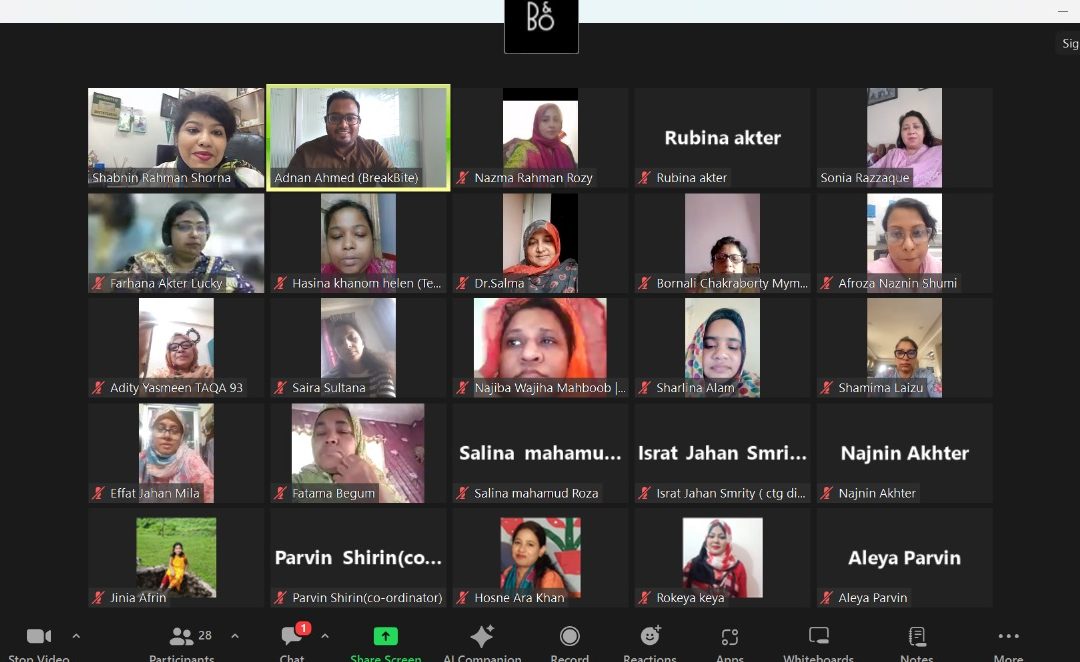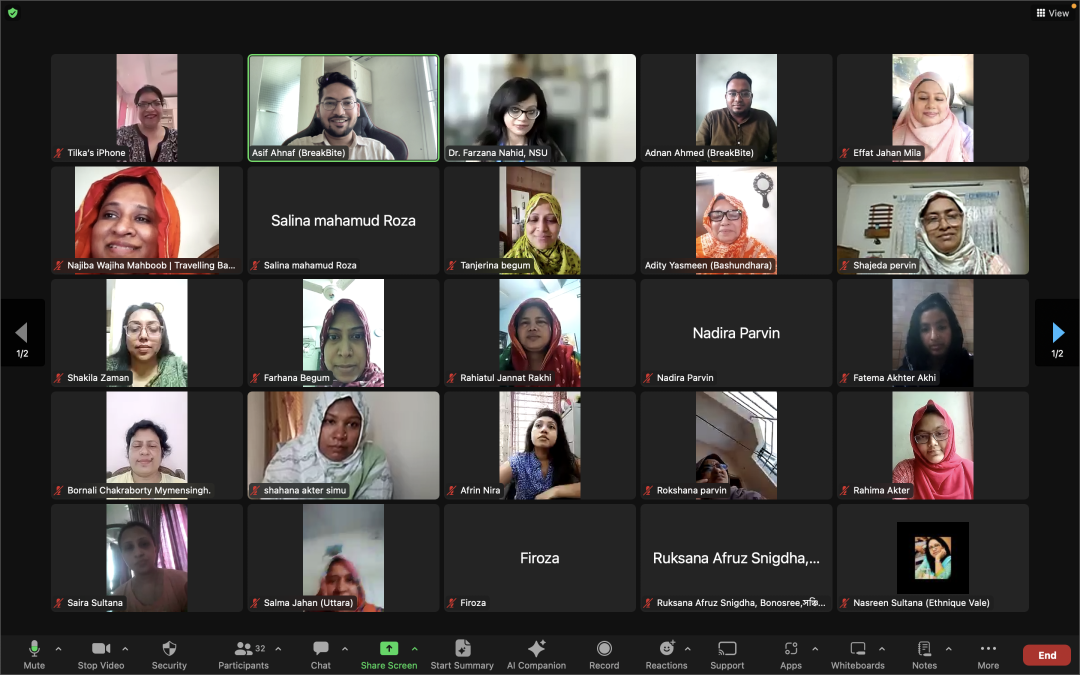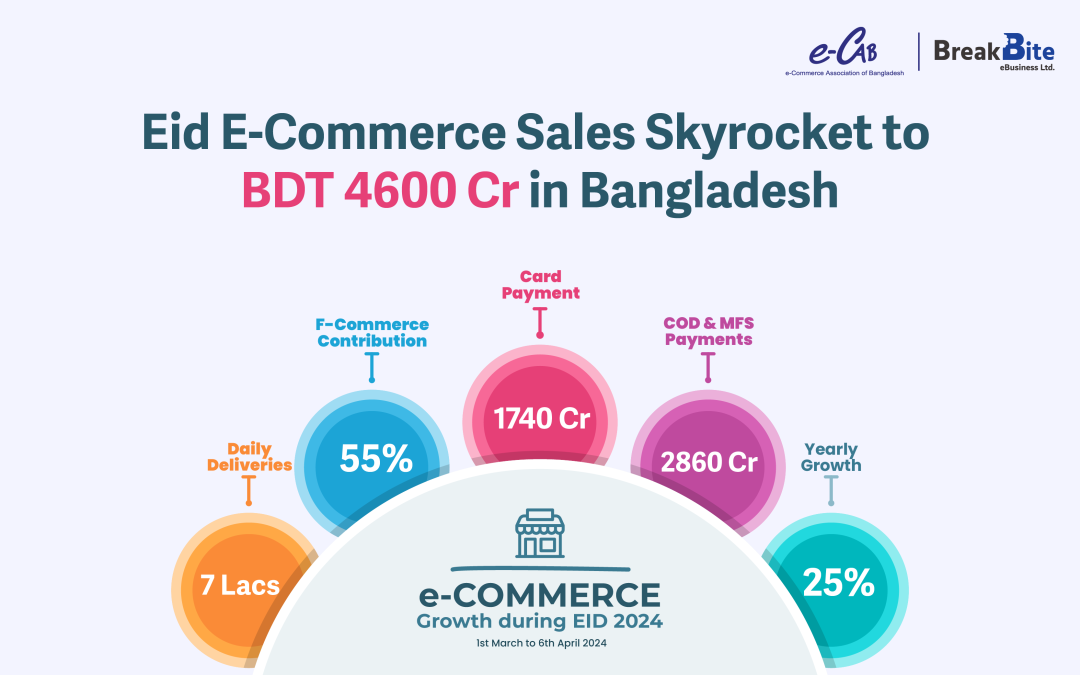
by BreakBite Editorial Wing | Apr 27, 2024 | WSME Business Insights
Empowering Women Entrepreneurs: Successful Online Q&A Webinar on HR Strategy by WSME Business Support Center
Date: April 27, 2024
Time: 1:00 PM to 2:15 PM
Mentor: Shabnin Rahman, Senior Lecturer, Department of Management, NSU
The Women Entrepreneurs Business Support Center, a key initiative under the We-Fi project of the World Bank, successfully hosted an enlightening online Q&A webinar on HR Strategy on April 27, 2024. The webinar was led by Shabnin Rahman, Senior Lecturer in the Department of Management at North South University, and focused on innovative human resource strategies for small and medium-sized enterprises (SMEs).
In her opening statement, Shabnin Rahman highlighted the financial hardships commonly faced by SMEs, which often hinder their ability to invest in attractive HR strategies. However, she emphasized that SMEs could implement effective HR strategies without incurring significant expenses. The webinar covered crucial HR topics, including:
- Hiring Strategy
- Training and Development Strategy
- Retention
- Employees’ Expected Behavior & Ethical Issues
The discussion was highly interactive, with many women entrepreneurs sharing their experiences and plans for managing and utilizing their workforce. Rahman provided practical examples and insights, illustrating how SMEs can adopt HR strategies without a designated budget.
Hiring Strategy: Rahman explained that hiring can be done cost-effectively. She suggested leveraging networks to search for employees, offering incentives to team members, and instituting a “day in the life” program to assess candidates’ passion for the job. Ms. Shahina agreed, noting that entrepreneurs could indeed hire without significant expenses by following these strategies.
Training and Development: Due to financial constraints, women entrepreneurs often cannot hire expert workers and must train their employees from the ground up. Rahman emphasized the importance of a proper training and development strategy, especially when the business is on the verge of expanding and introducing new products.
Retention: Entrepreneurs expressed concerns about retaining employees after investing in their training, as trained workers often leave for better-paying jobs or start their own businesses. Rahman offered several key points to enhance employee retention:
- Make workers feel connected to the business.
- Ensure employees feel like an essential part of the team.
- Foster a team-oriented environment without hierarchical barriers.
- Always pay employees on time and maintain a safe, healthy working environment.
- Provide small perks, such as free beverages and occasional team meals.
- Offer moral support and reasonable financial advances when needed.
Ethical Issues: Rahman addressed concerns about employees engaging in unethical practices, such as sharing product designs and sensitive business information. She advised dealing with such issues professionally by terminating unethical employees promptly and ensuring that employees do not feel indispensable.
During the webinar, Rahman shared insights from the Western business world, where employees handling customers sign documents committing to the principle that “Customer is always right.” This practice fosters a culture of respect and attentiveness towards customers, which many participating entrepreneurs found valuable.
The session was highly productive, providing women entrepreneurs with practical HR strategies and fostering a deeper understanding of effective workforce management. The Women Entrepreneurs Business Support Center continues to empower women entrepreneurs by offering valuable resources and insights through such webinars.

by BreakBite Editorial Wing | Apr 20, 2024 | WSME Business Insights
Empowering Women Entrepreneurs: In-Depth Online Q&A Session on Business Growth Strategy by WSME Business Support Center
Date: April 20, 2024
Time: 11:00 AM to 12:00 PM
Mentor: Tilka Farzana, Lecturer, Department of Marketing, NSU & Partner, Wed Window
The Women Entrepreneurs Business Support Center, a key initiative under the We-Fi project of the World Bank and organized by BreakBite in collaboration with North South University, successfully hosted a comprehensive online Q&A session on Business Growth Strategy on April 20, 2024. The session, led by Tilka Farzana, Lecturer in the Department of Marketing at North South University and Partner at Wed Window, provided invaluable insights into strategic business growth for women entrepreneurs.
Tilka Farzana began the discussion by sharing her inspiring journey of starting her own café, The Red Window Gulshan. She narrated how she nurtured her dreams and turned them into reality, emphasizing the importance of following one’s dreams and passion, listening to one’s heart, holding on to dreams, and nurturing them to grow. Farzana encouraged the participants with the mantra: “Never give up… start & restart!”
The session covered several critical growth strategies, including:
1. Market Penetration: Farzana discussed ways to increase market share within existing markets through competitive pricing, marketing efforts, and customer loyalty programs. She emphasized the importance of understanding customer needs and delivering consistent value.
2. Product Development: Strategies for innovating and improving products were highlighted. Farzana stressed the need for continuous research and development to meet evolving customer preferences and stay ahead of competitors.
3. Market Development: Exploring new markets and customer segments was a key focus. Farzana advised on identifying potential markets and tailoring products and marketing strategies to suit the new audience.
4. Diversification: The importance of diversifying product lines and services to spread risk and create new revenue streams was discussed. Farzana shared examples of successful diversification strategies.
5. Target Market Identification: Farzana explained how to effectively identify and target specific customer segments. She underscored the importance of market research and data analysis in crafting targeted marketing campaigns.
6. Value Proposition: Crafting a compelling value proposition that differentiates the business from competitors was a critical discussion point. Farzana highlighted the elements of a strong value proposition, including unique benefits and competitive advantages.
7. Team Building: Building and nurturing a strong team was emphasized as a cornerstone of business growth. Farzana shared strategies for recruiting, training, and retaining talented employees, even with limited resources.
8. Investment Options: Various investment options for business expansion were explored. Farzana discussed the pros and cons of different financing methods, including bootstrapping, venture capital, and loans.
9. Cost Leadership: Strategies for achieving cost leadership through efficient operations and cost-effective resource management were covered. Farzana explained how maintaining low costs can provide a competitive edge.
10. Cross-Selling: The benefits of cross-selling related products and services to existing customers were discussed. Farzana provided practical tips for implementing cross-selling strategies to increase revenue.
An intensive discussion took place with several women entrepreneurs who shared their experiences and challenges:
Rosy (Nurjahan Begum):
Business: Sharee Baksho & Panchfuron – Ma er ranna recipe
Issues: Time management, delivery issues, and products easily copied by competitors
Discussion: Strategies for team building, resource utilization, cloud kitchen investments, funding, and budgeting were explored.
Yasmin Sultana – Jessore:
Business: Nandonik Shomahar & Nandonik Bhoj
Issues: Challenges with the business model
Discussion: Focused on refining and improving the business model for better efficiency.
Bornali Chakraborty – Mymensingh:
Business: Bornali’s Cuisine
Issues: Large market size, need for resources, and team building
Discussion: Addressed strategies for acquiring resources and building an effective team.
Roksana Parvin – Pabna:
Business: Roksana r ranna r Moshla
Issues: BSTI issues and cross-border e-commerce
Discussion: Solutions for compliance with BSTI regulations and expanding into cross-border markets.
Rahaitul Jannat Rakhi:
Business: Girly Boutique – Maslin products
Issues: Slow sales progress, high production costs, pricing challenges, payment methods, quality of clothes, branding
Discussion: Strategies for improving sales, reducing costs, effective pricing, and enhancing branding.
Aditya Yasmin:
Business: Moshla
Issues: BSTI issues and cross-border e-commerce
Discussion: Similar to Roksana, focused on regulatory compliance and market expansion.
Nadira Parvin:
Business: Homemade Moshla
Issues: Delivery personnel, delivery costs, expansion and growth
Discussion: Solutions for managing delivery logistics and strategies for business expansion.
Fatema Akhter Akhi:
Business: Maria Fashion House
Products: Customized dresses, clothes, and potential expansion into male products
Issues: Market expansion, business growth, and investment for an outlet
Discussion: Explored avenues for market expansion and securing investments for a new outlet.
Farzana also highlighted the importance of delivery companies specifically catering to home businesses and discussed the scope of exporting, including dealing with BSTI issues and cross-border e-commerce. She provided practical advice and actionable strategies tailored to the unique needs of each participant.
The session was highly productive, offering women entrepreneurs a platform to discuss their challenges and receive expert guidance on business growth strategies. The Women Entrepreneurs Business Support Center continues to empower women by providing essential resources and insights through such interactive sessions.

by BreakBite Editorial Wing | Apr 4, 2024 | Industry Insights
As Bangladesh celebrated Eid this April, alongside the Bengali New Year, the e-commerce sector witnessed unprecedented growth, marking a significant milestone in digital commerce. According to a recent study conducted by BreakBite eBusiness , in collaboration with e-Commerce Association of Bangladesh (e-CAB), the total e-commerce transactions in March soared to BDT 4,600 crore, with digital payments via credit and debit cards reaching a record high of BDT 1,740 crore.
This year’s Eid festival, falling on April 11th, closely followed by the Bengali New Year on April 14th, provided a unique boost to sales, particularly favoring locally made products. This surge in demand is reflected in the delivery of an average of 7 lakh products daily throughout March, culminating in a staggering 2.5 crore products delivered from March 1st to April 6th. Comparatively, last year’s e-commerce transactions during the Eid festival totaled BDT 3,700 crore, indicating a robust 25% growth year-over-year.
Interestingly, approximately BDT 2,800 crore of the overall BDT 4,500 crore transacted came from Cash on Delivery (COD) and Mobile Financial Services (MFS) transactions. This shift underscores the growing reliance on and trust in digital payment solutions, though COD remains a significant player in the e-commerce payment landscape.
The demand spectrum this year saw electronics, particularly air conditioners and refrigerators, leading the categories as the summer season approaches. The second most popular category was Bengali fashion wear, reflecting the cultural significance of the Eid and Bengali New Year celebrations.
Top Sellers and Market Dynamics
In the electronics segment, leading platforms included Daraz , Pickaboo.com , BDSHOP.COM , Startech, Smart, Singer Bangladesh Ltd , Walton Group and RANGS eMART . Meanwhile, the fashion category was dominated by BRAC-Aarong and Deshi Dosh brands, with a notable portion of sales driven by Facebook commerce (f-commerce) entrepreneurs and Food and grocery delivery led by foodpanda & Chaldal .
With over 8,000 e-commerce companies active during this period and around 2 lakh f-commerce entrepreneurs participating, the market composition highlighted the significant contribution of f-commerce to the industry, accounting for 55% of total sales.
Local Manufacturing and Logistics Partners
The recent dollar crisis and international trade challenges have inadvertently bolstered the local manufacturing sector, with consumers increasingly opting for Made-in-Bangladesh products. Logistics played a pivotal role in meeting the delivery demands, with Steadfast Courier Limited and Pathao covering 40% of deliveries. Other notable logistics partners included REDX , DEX, Sundarban Courier Services Pvt. Ltd., Paperfly , Bili , Bahok Courier Limited , and more.
Digital Payments Leading the Way
The digital payment landscape was led by bKash Limited , Nagad , SSLCOMMERZ , aamarPay , alongside other banking operators facilitating transactions through VISA, Mastercard, and Amex, highlighting the diverse payment preferences of the Bangladeshi consumer.
Conclusion
This Eid season’s e-commerce boom not only signifies a shift towards online shopping in Bangladesh but also reflects the growing confidence in digital payments and the preference for locally manufactured products. As the industry continues to evolve, the insights from BreakBite eBusiness Ltd. and e-CAB’s study offer valuable foresight into the future of e-commerce in Bangladesh.
Asif Ahnaf
CEO, BreakBite eBusiness Ltd.
Finance Secretary, e-CAB



